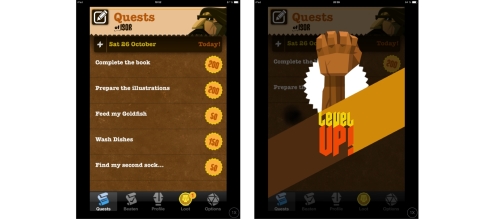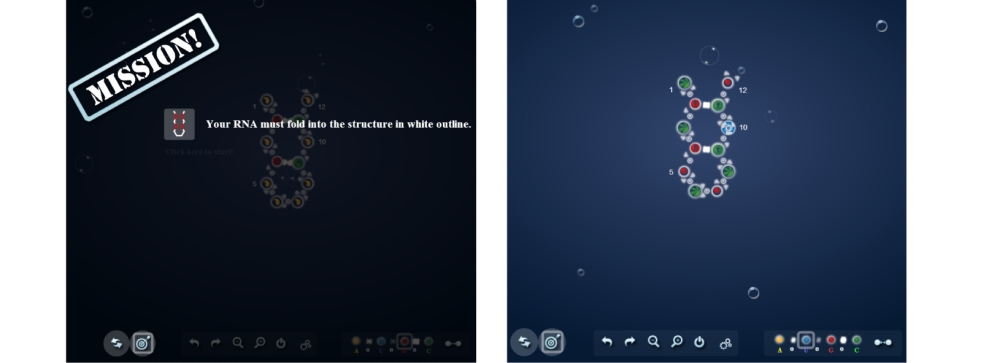Have you noticed that some real-life duties, even very simple ones, are always regarded as boring and exhausting; however, any gaming activity, even very complex ones, in contrary are perceived as very interesting and entertaining? Players may spend hours on video games without losing interest and attention, which means that so much of intellectual energy is concentrated on one particular process and is lost in space! What if it can be turned into something really useful? In such a case, a person may have some pleasant gaming experience and solve some real problems in one full swoop. This initiative became known as gamification. It turns a needful task into a game process by finding the right metaphors and mechanics. For example, it would diversify the meaning of domestic chores: a washing machine in the form of an arcade cabinet or a robotic vacuum cleaner transformed into a rover, exploring some unknown corners of some planets (this illusion is created using the AR technology).
The basic type of a "gamificated" job is a system of various achievements and trophies, so there is no gameplay as such, rather a system of rewards for various ordinary life actions. Did you do something good today? Say helped a colleague, called your parents, read a good book, fed your goldfish, ate some healthy food, or walked a mile? If the answer is yes, introduce some special achievements in each category.
People like prizes, as they have a very strong motivating power, and also like to share them with others. So social networks in this context are very useful.

The EpicWin application brings in a reward system from RPG video games into real life
There is an interesting application called EpicWin (http://www.rexbox.co.uk/epicwin/) that can turn any activity into a list of achievements. Moreover, it brings RPG Mechanics into the real world. The application turns any task in the user's sheduler into some sort of a game objective, once a task is complete the user gets some points. Then some special achievements can be attained. That sound funny, but it works, to get some virtual rewards user try to succeed in real world. It is not a surprise that many fitness-oriented applications use such approaches to encourage sportive accomplishments of their users. Another good example is various educational or training software. A system of achievements, which leads to real promotion, can be used in the project's management and, of course, in commerce. Loyal customers can be rewarded with virtual prizes and points that later can be transformed into a discount. Retail networks have been publicizing such promotions for years, motivating customers to buy specific products to collect special promotional stickers, and so on; however, now it can be demonstrated visually via a mobile application with game-like mechanics.
Remember that many non-entertainment applications can be "gamificated" to express functionality better and to have some effect on a user's behavior. There is also a term, serious game, that defines this wide class of applications. A very good example is the hybrid vehicle, Honda Insight, introduced in 2010. It had an Ecological Drive Assist System created to stimulate a more ecological style of driving a car. To attain such an objective, the system used a kind of mini game. By driving economically, a driver gets special points, which are displayed as leaves on virtual plants since the goal is to let them grow.
All the examples in this section are a little bit about selfishness. Users make some useful things for themselves, but there is a class of "gamificated" applications referred to as games with a purpose, dedicated to certain public interests. For example, some products help scientists resolve problems by splitting them up into a bunch of small and simple pieces that an ordinary person can deal with. This sounds similar to volunteer computing when people provided the calculating powers of their computers to a third party (the most famous example is the SETI@home project), but there is an important difference. The games with a purpose intend that gaming skills of real people are used rather than CPU time. There are some tasks where creative thinking of humans is required to solve problems or generate ideas. It is no secret that humans have better imagination than machines. This is a type of crowdsourcing where thousands of people all over the world work on one project or in one domain; the only difference is that an interface in the form of a game and objectives turn into abstract metaphors that can be used as the elements of a gameplay. As a rule, the goal looks like an unusual puzzle, requiring the player to search for some consistent patterns, recombining elements, and so on. A strong emphasis is made on unique human abilities such as intuition, a thing that none of the computers have.
The best example is the unique online puzzle, Foldit (http://fold.it/portal/), dedicated to protein folding. Players operate with the structure of proteins; the goal and virtual representation of elements are abstract enough, so a lot of people without a specific scientific background can take part in puzzle solving. The purpose of the project itself is to collect all the solutions that users can provide and to analyze them. In 2011, The Huffington Post wrote that it just took three weeks for Foldit to solve a protein problem of a monkey virus, a process which could not be solved by traditional methods for 15 years in a row. This is simply incredible!
The following screenshot is from a game with a purpose called EteRNA (http://eterna.cmu.edu/web/) where the process of designing RNA sequences turn into an elegant connection puzzle:

Various natural science tasks are usually presented in the form of puzzles. The game pieces are simple and in many cases have minimalistic design, and the rules are pretty tricky, an ideal mix! Archivist type of duties usually deal with an adventure genre when it comes into the picture; players can be pushed to click photos of a particular location to update an image bank, add tags to improve some search engines, test some digital solutions, and so on.
Of course, there are some disadvantages of gamification. First of all, not every activity can be easily split into abstract pieces and turned into a game. Some compromises should be made that can distort the reality giving inaccurate results. Another weak point can be derived from the main conceptual part of the method—I'm talking about people. The user community may be disappointing. There will be a lot of participants, but only a small number of active ones, so the overall activity can be ineffective. Finally, there are some moral and legal aspects. Are you playing the game with a purpose, is it a form of entertainment, or is it a form of work? In the case of scientific projects this, undoubtedly, is some kind of volunteering. But what if in the near future, an evil corporation creates a pretty attractive and addictive game, hiding its true meaning? In this case, thousands of players would solve the various puzzles without guessing that in reality, they provide employment to this evil corporation. This could be reckoned as some form of virtual exploitation of other people's efforts and ideas. Apparently this is a very good concept for a cyberpunk or dystopian novel. Nevertheless, there is a strong hope that such scenarios would appear only in fiction, but our everyday routine will become more vivid because of gamefication. For example, I end this particular chapter with an achievement saying, "Congratulations, you have completed writing this book!"
The following are the links you can refer to for additional information on topics that are used in this chapter:
- http://en.wikipedia.org/wiki/Fiducial_marker
- http://en.wikipedia.org/wiki/PrimeSense
- http://www.youtube.com/watch?v=ORfNNYCgtzI
- http://en.wikipedia.org/wiki/Bar_code
- http://inventors.about.com/od/bstartinventions/a/Bar-Codes.htm
- http://en.wikipedia.org/wiki/QR_Code
- http://en.wikipedia.org/wiki/ShotCode
- http://www.researchgate.net/publication/220302586_Invisible_Marker-Based_Augmented_Reality
- http://www.hitl.washington.edu/artoolkit/documentation/vision.htm
- http://www.hitl.washington.edu/artoolkit/
- http://en.wiktionary.org/wiki/%E4%BA%BA
- http://www.artag.net/
- http://campar.in.tum.de/twiki/pub/ISMAR/IarAbstractARTag/IarDetailsFialaSlides.pdf
- http://www.telepresenceoptions.com/2012/07/trying_out_canons_mixed-realit/
- http://citeseerx.ist.psu.edu/viewdoc/download?doi=10.1.1.134.2719&rep=rep1&type=pdf
- http://en.wikipedia.org/wiki/On_Exactitude_in_Science
- http://news.cnet.com/8301-1035_3-57605616-94/google-augmented-reality-game-ingress-to-expand-to-ios-in-2014/
- http://youtu.be/QnsR-kZUx6o?t=3m35s
- http://orbotixinc.github.io/Sphero-Docs/docs/sphero-api/index.html
- http://orbotixinc.github.io/Sphero-Docs/docs/collision-detection/index.html
- http://orbotixinc.github.io/Sphero-Docs/docs/sphero-locator/index.html
- http://jalopnik.com/5094111/2010-honda-insight-ecological-drive-assist-system-grows-leaves-gets-other-features
- http://www.huffingtonpost.com/2011/09/19/aids-protein-decoded-gamers_n_970113.html
